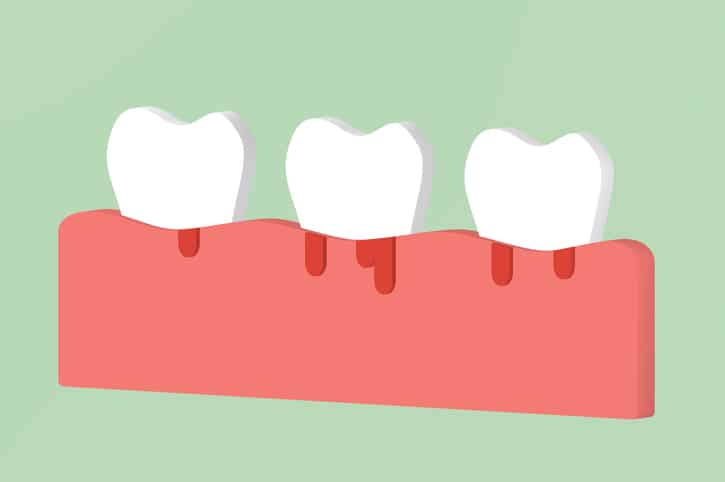The delicate tissues surrounding our teeth play an important role in our oral health. These tissues, referred to as gums, help to protect the roots of our teeth. When healthy, the gums provide a seal that prevents food particles and bacteria from affecting the supporting structures of the teeth. If the gums become inflamed, that important sealing effect can be compromised, leading to periodontal disease that may eventually lead to tooth loss if not treated. Inflamed gums may be swollen, tender to the touch, or painful. Gum swelling can occur any time and in any person, even those who routinely brush and floss their teeth.
What Causes Gum Swelling?

When healthy, gums are a light pink or coral pink color; when swollen, they take on an angry reddish appearance. Gum swelling is an indicator that there is an underlying condition causing inflammation.
There are several factors that may lead to swollen and painful gums. These factors can be environmental, such as exposure to excessively hot or cold foods and beverages. They may also become inflamed through irritation, such as being scratched by hard or crunchy foods or by aggressive tooth brushing.
The most common cause of gum swelling, however, is poor oral hygiene. When bacteria accumulate on, around, and between the teeth, the gums respond by swelling; this is an immune response designed to fight the bacterial infection. Gum infections may result in pain, bleeding, and general discomfort. They may also be accompanied by a fever as the body tries to ward off infectious pathogens.
In small children and in young adults, the eruption of adult teeth may lead to gum swelling around the tooth coming in. A condition known as pericoronitis is a localized gum infection around the erupting tooth.
As indicated earlier, gum swelling is usually a sign that there is something wrong in the mouth. Left untreated, gum infections can lead to:
- Bad breath
- Loss of supporting bone around the teeth.
- Tooth loss
- Nerve damage
Treating Gum Swelling
The first course of action when a person experiences gum swelling is to seek the help of a qualified family dental professional. Dentists evaluate each case, identifying problems before they can become worse. In gum swelling cases, bacteria are the leading sources of inflammation, although evidence of hard or careless tooth brushing may be present.
Most dentists will perform diagnostic x-rays to determine if damage to the tooth roots or supporting bones of the jaw has occurred. Teeth that have become damaged due to decay may be saved by performing root canals. Extraction of decayed teeth is also a possibility in severe cases. The gum infection itself is usually treated by antibiotics. As swelling and inflammation recede, the gums will regain their healthy pink appearance.
Preventing Gum Swelling
The very best way of preventing gum swelling and subsequent gum infections is to adhere to good oral health practices. Daily brushing and flossing removes food particles and decay-causing bacteria from the tooth surfaces. Many people follow up brushing with a mouthwash or mouth rinse, which can flush away any remaining bacteria.
Visiting the dentist for regular checkups and cleanings is an important part of oral health. Most people should visit their family dental clinic at least twice a year; for those with periodontal issues or a history of poor oral hygiene, more frequent visits may be needed. Your dentist can help you protect your teeth and gums. He or she can also stop gum swelling from leading to tooth loss through careful diagnosis and treatment.
